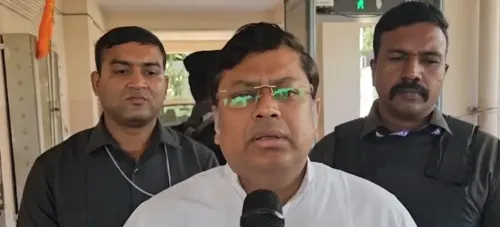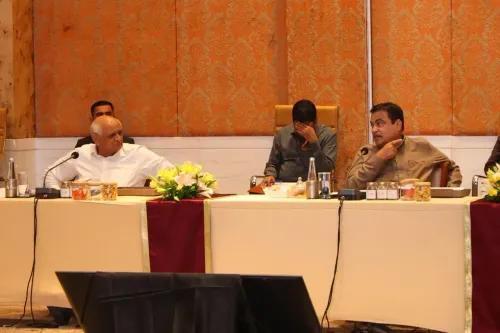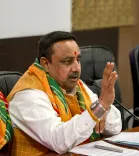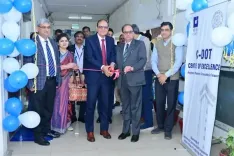Vishnu Pandya Shares Insights on RSS, PM Modi's Path, and Gujarat's Political Dynamics
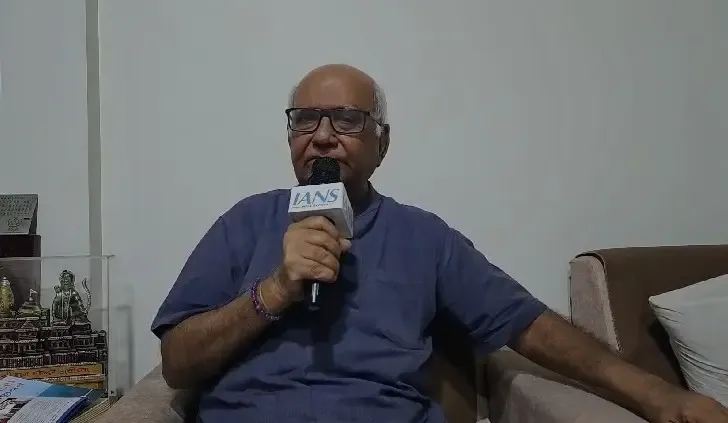
Synopsis
Key Takeaways
- Vishnu Pandya reflects on the RSS's impact on Indian politics.
- He highlights the challenges faced by Gujarat's political leaders.
- Modi's background and early influences are explored.
- The transformation of ordinary individuals into karma yogis is emphasized.
- Pandya's own resilience and literary contributions are noted.
Ahmedabad, March 17 (NationPress) Vishnu Pandya, a multifaceted journalist, biographer, poet, novelist, and political commentator from Gujarat, India, provided valuable insights during an interview with IANS.
As the chairman of Gujarat Sahitya Akademi since 2017, Pandya has been a significant voice in journalism for over four decades. He is well-known for his writings on politics, history, and notable historical sites, which are extensively published in Gujarati newspapers and magazines. Additionally, he holds the position of General Secretary of Vishwa Gujarati Samaj.
In his conversation with IANS, Pandya contemplated the Rashtriya Swayamsevak Sangh (RSS) and its influence on India's political framework. He remarked, "The RSS, since its establishment in 1925, has often been labeled as communal. However, it was during its inception that individuals like Narendra Modi joined and diligently contributed to its growth. The RSS is not centered on personal benefit but on seva (service). The Pracharaks dedicate themselves to a greater cause. Modi’s journey within the RSS lays the foundation for his nationalism education."
Pandya pointed out the challenges faced by Gujarat's political figures over the years, such as Jivraj Mehta, Chimanbhai Patel, and Madhavsinh Solanki. "Each of them encountered hurdles in their political careers in Gujarat. Communal issues were prevalent even before Modi's leadership," he stated.
As Gandhi asserted, 'Violence is violence, and it has no place in politics.' Communal tensions were emerging from Mumbai to Gujarat. Upon assuming leadership, Modi made significant changes influenced by his RSS background. He emphasized Sankalp (resolution), a concept derived from his work with the RSS, transforming ordinary individuals into karma yogis.
Pandya explored Modi’s modest beginnings, noting how his upbringing fostered resilience. "Modi hailed from a humble family. His mother undertook low-paying jobs, and they faced financial hardships. Consequently, he sold chai (tea) to soldiers at the nearby train station. He even sought to become a sanyasi (ascetic) by joining the Ramakrishna Mission, but was sent back home due to his youth. Ultimately, he became involved with the Jan Sangh during its early days. The Navnirman Andolan was also a pivotal moment that shaped his political ideology," he shared with IANS.
Pandya elaborated on Modi’s spiritual influences, stating, "He drew motivation from Pramukh Swami but was not confined to a single sect. He took inspiration from various gurus. The Ramakrishna Ashram significantly shaped him. His devotion was profound -- first to his mother and subsequently to Mother India.
Vishnu Pandya’s own narrative is marked by perseverance and commitment. During the Emergency of 1975–76, he faced imprisonment. At that time, his debut book, Haheli nu Aakash, received recognition from the Gujarat Government and won an award, which he declined. His contributions to historical literature earned him the Narmad Suvarna Chandrak from Narmada Sahitya Sabha in 1991. In 2017, he was awarded the Padma Shri for his work in literature and history, and in 2019, he obtained a D.Lit. from Gujarat University.

